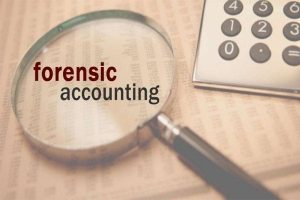All what you want to know about Forensic Accounting is HERE!!

All what you want to know about Forensic Accounting
What is Forensic Accounting?
Forensic accounting is the application of accounting principles and techniques to gather, analyze, and present financial information for use in legal proceedings. This type of accounting involves conducting investigations to uncover fraud and other financial misconduct, and may involve analyzing financial records, conducting interviews, and working with legal and other professionals to present findings in a clear and concise manner.
Forensic accountants are often called upon to provide expert testimony in legal proceedings and may be involved in cases such as divorce proceedings, bankruptcy cases, and criminal investigations. They may also be involved in more proactive activities, such as helping businesses develop internal controls to prevent financial fraud and misconduct.
Forensic accounting requires a strong background in accounting, as well as strong analytical and investigative skills. It is a specialized area of accounting that requires a thorough understanding of financial systems and transactions, as well as the ability to identify and analyze financial abnormalities.
When may you need a Forensic Accounting Report?
There are a number of situations in which a forensic accounting report may be needed. Some examples include:
- Civil litigation: A forensic accounting report may be commissioned by a court in civil litigation to provide an independent analysis of the financial aspects of a case.
- Criminal investigations: A forensic accounting report may be prepared as part of a criminal investigation into financial crimes such as fraud, embezzlement, or money laundering.
- Bankruptcy proceedings: A forensic accounting report may be requested in bankruptcy proceedings to help determine the financial status of a business or individual.
- Divorce proceedings: A forensic accounting report may be commissioned in divorce proceedings to provide an analysis of the financial assets and liabilities of the parties involved.
- Internal investigations: A business or organization may commission a forensic accounting report as part of an internal investigation into financial misconduct or fraud.
- Mergers and acquisitions: A forensic accounting report may be prepared as part of the due diligence process in a merger or acquisition to identify any potential financial issues.
- Fraud prevention: A business may commission a forensic accounting report to help identify weaknesses in their financial systems and develop strategies to prevent fraud and financial misconduct.
Is it possible that an account auditor can do a forensic accounting report?
Auditors are trained to identify and report on financial irregularities, and they may be involved in forensic accounting investigations. However, forensic accounting goes beyond the scope of a traditional audit and requires a more in-depth and specialized understanding of financial transactions and the ability to analyze and present financial information in a clear and concise manner for use in legal proceedings.
Forensic accountants are typically trained specifically in forensic accounting and have the skills and knowledge necessary to conduct thorough investigations and prepare detailed reports for use in legal proceedings. They may also be called upon to provide expert testimony in court.
While auditors and forensic accountants may both be involved in identifying financial irregularities, their roles and responsibilities are distinct, and a forensic accounting investigation typically goes beyond the scope of a traditional audit.
What you need to be a Forensic Accountant?
To become a forensic accountant, you typically need to have a strong background in accounting and finance, as well as analytical and investigative skills. Specific requirements may vary, but some common steps to becoming a forensic accountant include:
- Earn a bachelor’s degree in accounting or a related field: Most forensic accountants have a bachelor’s degree in accounting, finance, or a related field.
- Obtain professional accounting certification: Many forensic accountants hold a professional certification such as a Certified Public Accountant (CPA) or Certified Fraud Examiner (CFE). These certifications require additional education and experience, as well as the successful completion of an exam.
- Gain experience: Many forensic accountants have several years of experience working in accounting or finance before entering the field of forensic accounting. This can be helpful in developing the necessary skills and knowledge to succeed as a forensic accountant.
- Specialize in forensic accounting: Some forensic accountants choose to specialize in forensic accounting by obtaining additional education and training in this area. This may include taking forensic accounting courses or earning a master’s degree in forensic accounting.
- Keep up to date with developments in the field: As with any profession, it is important for forensic accountants to stay up to date with developments in the field and maintain their skills and knowledge through continuing education.
We are at WALL STREET CONSULTANCY can create a strong forensic accounting report based on the available evidence, while using our auditing, analytical experience.
